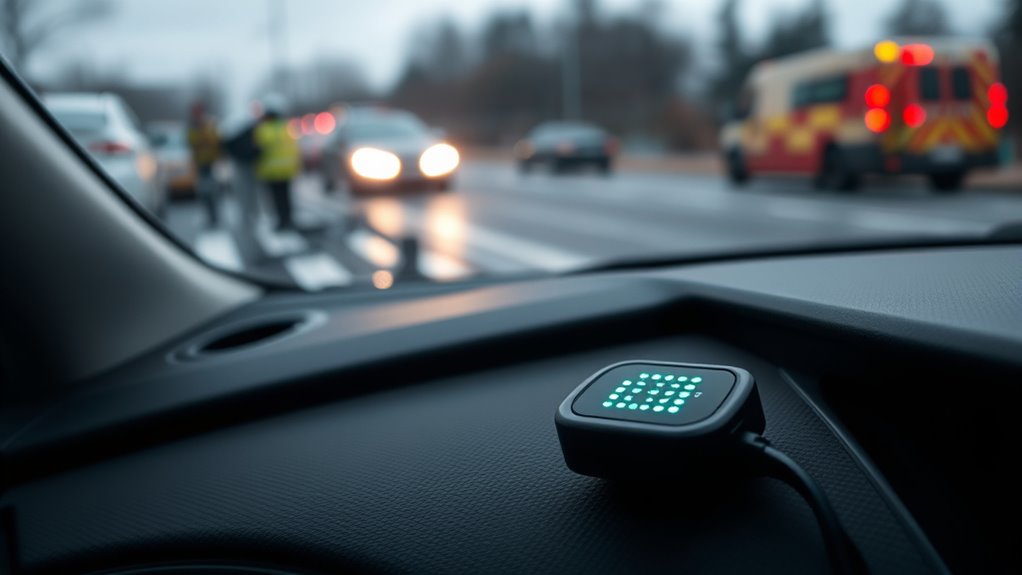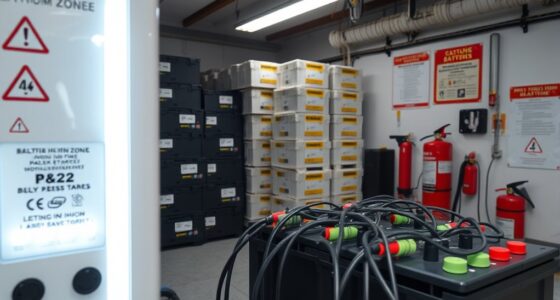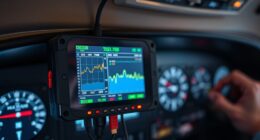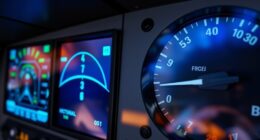Data recorders, or black boxes, are essential in accident investigations because they capture precise details about vehicle performance and driver actions during a crash. They track data like speed, braking, steering, and seatbelt use, providing an unbiased account of what happened. This helps investigators determine if driver error, mechanical failure, or external factors caused the crash. To learn how technological advances enhance this process, keep exploring how these tools are transforming accident analysis.
Key Takeaways
- Data recorders provide precise, time-stamped information on vehicle speed, braking, and steering during crashes.
- They help determine driver behavior, such as sudden acceleration or distraction, contributing to cause analysis.
- Embedded in vehicles, they offer objective, detailed incident data that surpasses eyewitness accounts.
- Analysis of recorder data enables accurate fault determination and reveals mechanical failures or external factors.
- Advanced data recording supports quicker investigations and improves road safety through targeted prevention.

Have you ever wondered how organizations determine what caused an accident? It’s a complex process that relies heavily on data recorders to piece together the events leading up to a crash. These devices, often embedded in vehicles, capture critical information about driver behavior and vehicle performance, providing investigators with detailed insights that might otherwise be impossible to obtain. By examining this data, organizations can identify whether reckless driving, distraction, or other driver behaviors contributed to the incident. This helps not only in understanding the specific accident but also in developing strategies to prevent future crashes.
Technology advancements have revolutionized accident investigations. Modern data recorders, sometimes called Event Data Recorders (EDRs) or black boxes, can record a wide array of information such as speed, braking patterns, steering input, seatbelt usage, and even the activation of safety systems. These advancements mean investigators now have access to precise, time-stamped data that paints a clear picture of what was happening moments before, during, and after an incident. This level of detail surpasses traditional eyewitness accounts, which can be biased or incomplete, making the investigation more accurate and efficient. The integration of vehicle diagnostics further enhances the ability to assess mechanical aspects of the crash.
When a crash occurs, investigators don’t only look at physical evidence at the scene but also analyze the data recorder’s information to determine driver behavior. For example, sudden acceleration, abrupt braking, or swerving can indicate distracted or impaired driving. In some cases, the data might reveal that the driver was exceeding the speed limit or disregarding traffic signals. These insights help establish whether the cause was driver error, mechanical failure, or external factors like road conditions. The combination of driver behavior analysis and technological data provides a thorough view of the incident, facilitating fair and accurate conclusions.
Furthermore, the continuous evolution of technology means data recorders are becoming more sophisticated, offering real-time monitoring and remote diagnostics. This not only speeds up investigations but also allows fleet managers and insurers to proactively address risky driver behaviors before accidents happen. For drivers, understanding that their actions are being recorded and analyzed can serve as a deterrent to unsafe practices, promoting safer driving habits.
In essence, data recorders serve as an impartial witness that captures the true story behind a crash. They leverage technological advancements to decode driver behavior and vehicle performance, transforming accident investigations from guesswork into a precise science. This progress ultimately enhances road safety by enabling more accurate fault determination and targeted preventative measures.
Frequently Asked Questions
How Accurate Are Data Recorders in Different Vehicle Types?
Data recorders are quite accurate across different vehicle types, but their precision can vary due to vehicle type variability. In newer models, recorder accuracy tends to be higher because of advanced sensors and technology. However, in older or specialized vehicles, accuracy might decrease due to outdated equipment or less sophisticated systems. You should consider these factors when relying on data recorders for crash analysis, as vehicle type impacts data reliability.
Can Data Recorders Prevent Future Accidents?
You might think data recorders can prevent accidents, but they mainly influence driver behavior and legal implications. By providing real-time feedback and evidence, they encourage safer driving habits. While they don’t stop crashes directly, the awareness of being monitored prompts drivers to stay alert, reducing risky actions. Over time, this proactive approach helps prevent future accidents, making roads safer for everyone and giving you peace of mind.
What Privacy Concerns Are Associated With Data Recorders?
You might worry about driver privacy and data security with data recorders. These devices collect sensitive information, so there’s concern about how that data is stored and who can access it. To protect your privacy, companies must implement strict data security measures and clear policies on data use. Being informed about what data is collected and how it’s protected helps you feel more confident and secure with data recorders.
How Quickly Is Data Recovered After an Incident?
You’d be amazed at how lightning-fast data retrieval speed can be—often within seconds or minutes after an incident! Modern data recorders are designed for rapid incident response times, ensuring vital crash data is recovered almost instantly. This immediate access helps investigators analyze crashes efficiently, enabling quicker safety improvements and reducing downtime. So, when disaster strikes, you can count on swift data recovery to get to the root of the problem fast.
Are Data Recorders Mandatory in All Vehicles?
No, data recorders aren’t mandatory in all vehicles. Vehicle regulations vary by region, and some require data recorder technology only in specific types like commercial or new vehicles. You should check your local laws to see if your vehicle needs one. Data recorders help in accident investigations by providing valuable information, but their installation depends on regional regulations and the vehicle’s purpose.
Conclusion
In the end, data recorders act as silent witnesses, capturing every detail that might otherwise be lost. While they reveal technical truths about crashes, they also remind you that behind every accident lies human decision and vulnerability. Just as a recorder preserves moments, understanding these moments helps you learn and grow. Ultimately, data isn’t just about numbers; it’s about uncovering the stories behind the crashes, guiding you toward safer journeys ahead.









